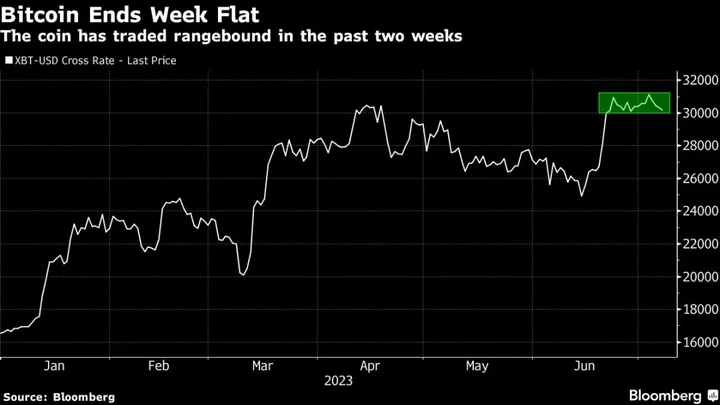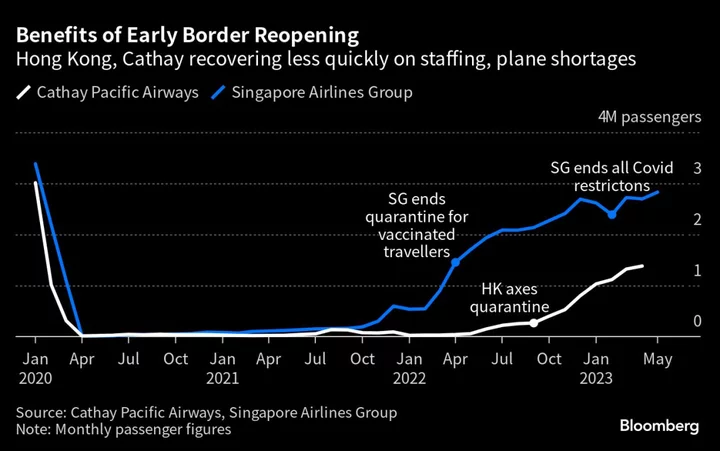Bitcoin is ending the week on a down note after the optimism that pushed the price of the largest digital asset to a one-year high fades amid a flurry of fresh industry turmoil and crosscurrents in global financial markets.
The cryptocurrency, which accounts for about half of the crypto sector’s $1.2 trillion market value, edged lower for a fourth consecutive day to settle around $30,200 on Friday. The token briefly touched $31,504 on Thursday, the highest level since June 2022.
“After Bitcoin’s massive 14% gain last week, the market took a healthy hiatus,” wrote K33’s Bendik Schei and Vetle Lunde in a note.
Meanwhile, the nonfungible-token market witnessed a dramatic selloff as prices of major collections slumped amid growing doubts over the value of digital collectibles. ApeCoin touched an all-time low while prices for related NFTs such as the Bored Apes tumbled.
The recent jump in Bitcoin coincided with a raft of filings for Bitcoin exchange-traded funds in the US, driven in large part by an application by Wall-Street heavyweight BlackRock Inc., which has a near-pristine record of filing for and receiving approval for all manner of ETFs.
Even so, any approval won’t be transformational for the sector despite broader optimism if Canada and Europe are any guide, said JPMorgan strategist Nikolaos Panigirtzoglou. Such products have existed in both regions for years and have not seen tremendous inflows.
What’s more, the prospects of the Federal Reserve raising borrowing costs this month increased after stronger-than-expected private payrolls data affected how Wall Street views risk assets, Bitcoin included. Swap traders are almost fully pricing in a quarter-point increase for their July meeting, and about 40% odds of another one by year-end.
“Higher rates are having an impact,” said Matt Maley, chief market strategist at Miller Tabak + Co. “The bulls were already disappointed that Bitcoin couldn’t break out after the euphoria surrounding the BlackRock ETF filing. So, this recent jump in interest rates is throwing salt on the wound of those bulls.”
To Stephane Ouellette, chief executive of FRNT Financial Inc, an institutional platform focused on digital assets, a higher interest-rate environment could weigh on Bitcoin and crypto prices in the near-term.
“Any speculators will be less incentivized to move up the risk curve as capital is generally more expensive,” he said. “That said, blockchain data tells a clear story of the dominant investor profile in BTC being a long-term holder, which tend to be less sensitive generally to macro factors.”
An intensifying regulatory clamp down on the industry began last year and does not look to be abating soon. Binance Holdings Ltd., the world’s largest crypto exchange, saw its chief strategy officer, general counsel and a compliance official depart, stirring fresh questions about the outlook for an exchange that’s facing probes in the US, Europe and Asia Pacific.
Then there are crypto firms suing other crypto firms. Gemini Trust Co., the digital-asset exchange founded by the billionaire Winklevoss brothers, filed a lawsuit against Digital Currency Group Inc. and its chief executive officer Barry Silbert, alleging “fraud and deception” stemming from a failed lending venture between the two firms.
The lawsuit comes after a months-long public dispute between the Winklevoss twins and Silbert over hundreds of millions of dollars in frozen funds related to Genesis Global Holdco, a now-bankrupt DCG subsidiary.
Michael Rosen, chief investment officer at Angeles Investments, said he questions why investors buy these tokens in the first place.
“I have long believed that these private cryptocurrencies fall somewhere between a delusion, a fraud and a scam,” Rosen said. “It’s somewhere in there. So I have no idea why anyone is involved in these things.”
--With assistance from Olga Kharif.









